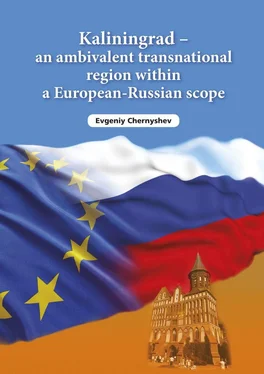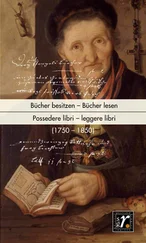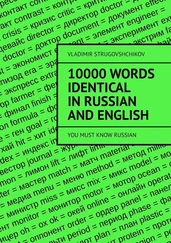Taking into account the objectives set out in this study should be made, first of all, the following concepts: region 68 68 Voskressenski, Alexei; Porfiriev, Boris; Columbus, Frank (ed,): Russia on the Brink of the Millennium: International Policy and National Security Issues. New York 1998.
; regional culture 69 69 Ljapkina, Tatjana: Region kak predmet mezhdisziplinarnogo analiza. In: Sozialno-gumanitarnyje znanija, 3 (2007).
; are applied to the Kaliningrad regional culture – enclave and exclave 70 70 Vinokurov, Evgenij: Anklavy v mirovoj politike i ekonomike: opyt poslednich desjatiletij. In: Mezhdynarodnaja ekonomika i mezhdynarodnyje otnoshenija, 9 (2002).
; cultural landscape 71 71 Zamjatin, Dmitrij: Kultura i prostransto: Modelirovanije geograficheskich obrazov. Moscow 2006.
.
The concept – the region – is considered in the thesis as a socio-cultural phenomenon, which is caused by the specifics of the geopolitical, ethno-cultural, historical and cultural diversity of the Kaliningrad region.
Regional culture is understood in this thesis as original integrity of certain area, which is reflected in the human mind, representing the unity of the world of nature, and society. This totality has temporal and spatial characteristics.
Since the literature on various aspects of the Kaliningrad region often contains the term enclave/exclave and enclaveness / exclaveness , so in the dissertation analyzed the significance of these definitions and varied contexts of their application. According to fundamental research on this topic by Vinokourov 72 72 Vinokurov, Еvgenij: Teorija anklavov, Kaliningrad 2007.
, I define the enclave as part of the territory of the state, surrounded by the territory of another state. In cases if the area has access to the sea used the notion of half-enclave . The decisive criterion for enclave-defining is the sovereignty over a particular territory. Under the working theories of exclaves, an exclave is understood as a region separated from the mainland, surrounded by more than one other state: since Lithuania declared independence in 1990 the Kaliningrad region became an exclave of the Soviet Union, but after its collapse – an exclave of the Russian Federation.
Exclaveness, pogranichnost 73 73 Pogranichnost’ – is finding yourself in a «bordered zone» between physical borders, which forms a specific psychological status.
, multi-ethnicity, multireligious, multilayered ambivalence are hallmarks of the Kaliningrad region culture, that’s why has importance the concept of the Kaliningrad regional identity: it reflects the specific features of bordered region.
In this thesis to analyze the cultural space of the Kaliningrad region and to identify its specific was applied cultural approach, which allowed integrating accumulated research knowledge about the region. Cultural analysis involves a comprehensive study of the processes and trends taking place in the cultural space of the region.
Cultural analysis of complexly organized cultural space of the Kaliningrad region has caused a systematic approach to development, which had an important methodological significance for this study.
In this regard, was paid considerable attention to the concepts of enclave/exclave self-consciousness . Also in the thesis the influence of the enclave/exclave condition of the region on the identity of youth is shown. Therefore, the proposition is substantiated: in result of exclave character of region among young residents forming an identity, which is different from typical Russian – regional and local components are more significant than in other regions of Russia.
Thereby I perceive the region as a concentration of cultural reflection, which gives rise to new cultural meanings and creates new cultural texts that embody regional, Russian and all-European features.
I assume that the cultural space has integrative and evaluative properties. I share the point of view of cultural scientist Lotman 74 74 Lotman, Yuri: Kultura i vzryv, Moscow 1992.
. He defined cultural space as a shared memory space from the standpoint of semiotic concept of culture. That is, culture is a collective memory and collective intelligence, which produces a supra-individual mechanism for storing and transferring of traditional texts, and developing of new texts.
However, time transforms the system of cultural codes, and thus changing the paradigm of memory – it is particularly the case within the Kaliningrad regional culture in the context of discussions about the relation to the German cultural heritage of the former East Prussia. Memory function allows restoring cultural dimensions. In the cultural space can coexist cultural dimensions of the present and of the past: their dialogue. It is about the coexistence of cultures, intercultural dialogue, which – given the meaning the pogranichnost of the regional culture and its historical specificity – is of particular importance for this study.
I distinguish and implement the following spatial couples, which, in my opinion, are specific especially for Kaliningrad regional culture: mainland/enclave, surrounding state/half-enclave, Russia/West, center /periphery, Königsberg/Kaliningrad.
Results of empirical studies show that in the case of Kaliningrad regional culture, in contrast to the typical Russian dichotomy of East/West and Europe/Asia , following semantic pairs have fundamental meaning – West (Kaliningrad region) /East (Russia) and Europe/ Russia (Kaliningrad region).
Identity: Transnational region
It should be taken into account that potential rivalries and conflicts between local, regional, national and supranational levels of co-operation must not be ignored. At best, these levels complement each other, creating a European identity in diversity 75 75 Bort, Eberhard: Mitteleuropa: the difficult frontier. In: Anderson, Malcolm; Bort, Eberhard (ed.): The frontiers of Europe. London 1998, p. 103.
. We can find the increased attention to the «Europe of the regions» 76 76 Keating, Michael: Is there a regional level of government in Europe? In: Le Gales/Lequesne 1998, p. 8—26.
in numerous studies. Generally, this attention is directed to the «interaction of memory culture and regional history» 77 77 Schmid, Harald (ed.): Erinnerungskultur und Regionalgeschichte. München 2009; Lancaster et I al. 2007
, as well as to political, economic, and social forces involved in constituting a region and establishing regional identities 78 78 Mühler, Kurt; Opp, Karl – Dieter: Region und Nation: Zu den Ursachen und Wirkungen regionaler und überregionaler Identifikation. Wiesbaden 2004
.
As I turned to the issue of the region and to Kaliningrad region as an example of it, than would be taken into account that the meaning attached to region can vary quite dramatically depending on the perspective from which it is considered. As Michael Keating notes, «there is consensus that the term refers to space, the notion of space itself can have several meanings: territorial space; political space and the space of social interaction; economic space; functional space» 79 79 Keating, Michael: Is there a regional level of government in Europe? In: Le Gales/Lequesne 1998, p. 8.
.
Identity is considered being a very versatile and controversial, capacious concept, which occupies a key place in the discourse of Kaliningrad (inside) and about Kaliningrad (from outside). The inevitable background of this discourse is the border modality of the region. If I turn to Barth , who pointed out that the differences between cultures, and their historic boundaries and connections, have been given much attention, I recognize that his study provided a significant impetus to expand the horizons of the state of research in the second half of the 20th century, with a focus on the «constitution of ethnic groups, and the nature of the boundaries between them» 80 80 Barth, Fredrik: Ethnic groups and boundaries: the social organization of cultural difference. Long Grove 1998, p. 9.
, which have not been correspondingly investigated before. Opinion that the borders are «meaning-making and meaning-carrying entities, parts of cultural landscapes which often transcend the physical limits of the state and defy the power of state institutions» 81 81 Donnan, Hastings; Wilson, Thomas: Borders: frontiers of identity, nation and state. Oxford 1999, p. 4.
finds justification in a place like the ambivalent region of Kaliningrad.
Читать дальше











